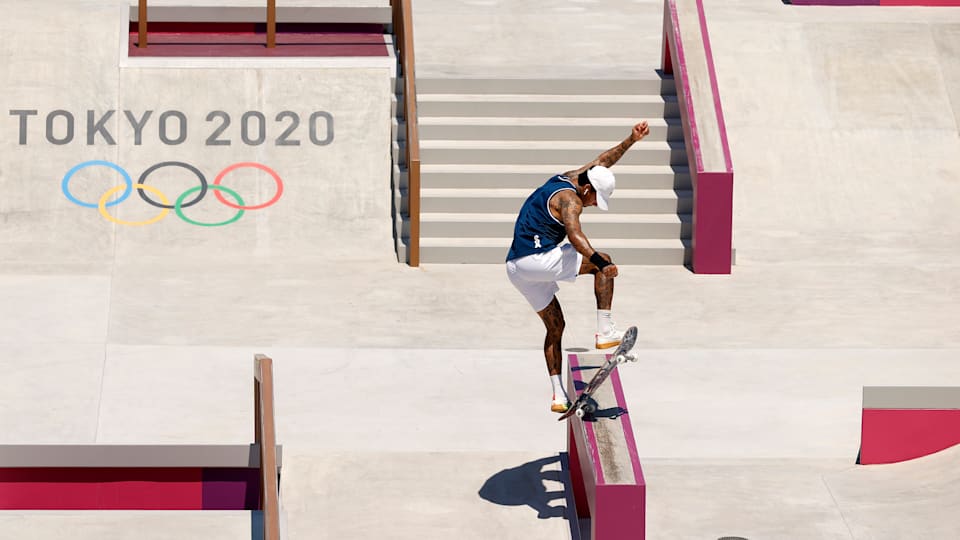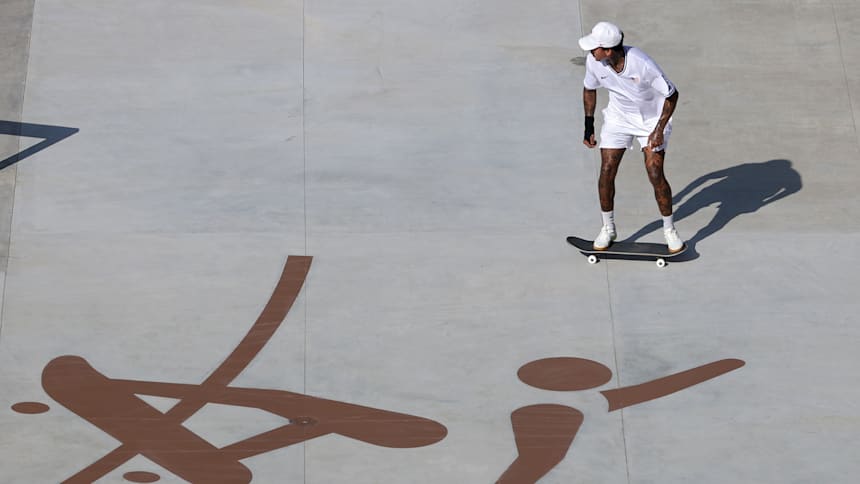Superstar rider Nyjah Huston: “Skateboarding more of an art” for USA’s golden hope
Nyjah Huston is the biggest name in skateboarding (aside from the long-retired but ever-famous Tony Hawk). He spoke to Olympics.com about nerves, how sport - skating in particular - became a gateway to a larger world during a sheltered youth and his hopes for a big Olympic debut that he thinks is long overdue.

Nyjah Huston doesn’t leave much to chance.
He’s the biggest name in skateboarding for a reason. Talent, sure – but the endless toil and repetition, the grind top athletes all seem to embrace and crave – is the foundation that turned the man, known simply now as Nyjah, into a skateboarding supernova.
“I’m so used to looking at these course designs and doing what I need to do to get a win,” Huston told Olympics.com last month via video chat from his Laguna Beach, California home with its gleaming white lines, floor-to-ceiling windows and panoramic views of the Pacific Ocean stretching out into an infinity beyond.
“So I've already been doing these tricks in my mind for a while, knowing what I need to do and what I need to practice,” he said of his plans – known only to himself – for his 45-second runs on the Ariake Urban Sports Park concrete at the first-ever Olympic skateboarding competition. “When I see the course I can really, really picture it.”
A planner by nature
Huston’s been poring over the course design since details were released in April. There wouldn’t have been any surprises, either, as the California Skateparks team that did the build and design work were the same brains and brawn behind Huston’s personal indoor skatepark. At an undisclosed location near his house, it’s been his laboratory for street skating alchemy through the pandemic and the year delay of the Games.
READ | Street Skater Jake Ilardi: USA's Quiet Man | Bufoni - Brazil's Women's Skate Icon
Everyone in the world of skateboarding has an opinion on Huston.
There are those, purists they might call themselves, who bristle at his crossover success into the larger culture. He gets some side-eye for his Lamborghini and his net worth in the neighbourhood of $12million USD. He has a room in his house dedicated, exclusively, to his trophies – and he’s running out of space in it.
This type of thing can attract the haters. Navigating contempt is an occupational hazard for those at the top of their respective fields. It’s the other side of the adulation coin. His sheer domination of the contest circuit since he was a child, under 151cm tall with dreadlocks down to his knees, hasn’t earned him undisputed admiration.
Isolation can be the price of massive success – especially in a sport like skateboarding where image and cool and an ill-defined sense of authenticity all mingle.
Champion, entrepreneur and artist?
The timing of the announcement of his own board company, Disorder, last month – on the eve of his likely coronation as the sport’s first gold-medal winner – was no accident. Again, nothing is left to chance in Nyjah-World.
“It’s surprising to me that it’s taken this long,” Huston said about skateboarding’s inclusion in the Olympic programme – some 70 years since the birth of the hybrid culture/sport on the streets of southern California. “Skateboarding is such a worldwide sport, an activity that kids and everyone do.
“It's also very accessible compared to most other sports,” added Huston, who grew up in Davis, California in unusual circumstances, with an old skateboard as one of his few connections to a larger world. “You know, you don't need a team. All you need is yourself, motivation and your skateboard and some decent shoes. And you can go out there and skate wherever, whenever.”
Huston’s origin story is full of intrigue.
His early boyhood was spent under the thumb of a punishing and demanding father, an adherent of a strict strain of Rastafarianism. Huston was home-schooled by his mother. He’s never set foot in a classroom. With little input from the outside world (few friends, almost no TV allowed, limited access to the bonding agents of pop culture), Huston entered a world of intense discipline early through skating.
The grind that never ends
He worked from an early age to perfect trick after trick. He put all of himself into his skating, starting at age five. His father watched on, and pushed, and tried to forge his talented son into skateboarding steel that wouldn’t crack. That couldn’t crack.

Huston made his first X Games appearance at the impossible age of 11 (he’s 26 now). His first sponsorship came at age 7. From there, his reputation only grew. His dominance became complete with four world championships and 12 golds at the X Games (in all, more than 40 major contest wins).
He’s the world’s number-one street skater by miles, and has been for years. He’s got more followers on social media than bona fide Olympic royalty Simone Biles. And the next step, the Olympic slingshot, is set to launch him into a stratosphere beyond the ecosystem of skating.
“It's so much more than just going out there and competing for some money or doing your job. It's really more of an art,” said Huston, eager to confirm that his skating is more than a money-grab or a mechanical pursuit planned out and over-examined. “It's a lifestyle. It's going out there and having fun with your friends and really, really just having a good time.”
Independent and still dominant
Huston has been estranged, for years now, from the father who introduced him to skateboarding. He cut his long dreadlocks, too, a physical break with a past that brought out a great talent in him but left him distant from his peers in a culture that honours camaraderie
Huston’s mastery of the tricks he does – the flips and rail grinds and the combinations of every kind – is there to see every time he takes to the course, or a street spot to film. And artist or not, his competitive drive is terrifying
“The pressure and nerves you get, mixed with how technical skateboarding is, this is not a good match,” Huston admitted, a nervous smile on his face as he described the singular challenges of a sport that brings with it the promise of both massive catastrophe and reward. “Handling that pressure as a skateboarder is really not easy because literally any small little movement and things can go wrong.”
And Huston will be hunted by others hungry for the Tokyo gold. The rest of the world’s street stars, like Japan’s HORIGAME Yuto, who edged Huston at the world championships last month in Rome, Gustavo Ribeiro of Portugal and even USA teammate Jake Ilardi, have been out in the world grinding away their own rough edges.
“Every year you see new kids come up that are so good, you've literally never heard of them,” Huston said, aware he’s always being chased, especially by Horigame, who Huston calls one of the “most consistent skaters” he’s ever seen. “And then all of a sudden you're skating in the finals with them and you're like: Where the hell did he come from? He's so good.”
Skateboarding, sport an early window
“Our dad was strict. He didn't really allow us to watch a lot of normal TV and stuff, but I do remember watching the Olympics,” said Huston, who, with virtually his entire body covered in tattoos, says he would consider a piece of Olympic body art, perhaps on his face, should he win gold. “Sports were one of the things we were allowed to watch on TV. We used to watch basketball a lot. And, yeah, the Olympics too.”
With skateboarding now an Olympic reality, the courses built and the stage set, Huston has the opportunity to be launched, once more, into orbit via this simple contraption – “a piece of wood with wheels,” as his fellow street skater Jamie Foy once called it, shaking his head with a sense of endless wonder.
Joining a pantheon of immortals that includes Usain Bolt and Michaels (Jordan and Phelps) is a possibility for Huston – a likelihood according to many.
“One foot positioned wrong, one little bit of balance off can just throw you off your whole trick,” concluded Huston, who knows better than most the high cost of success and the narrow margins between glory and failure. “So you’ve really got to be in the zone out there and stay focused and just try to stay calm and not let all that pressure get to you.”

